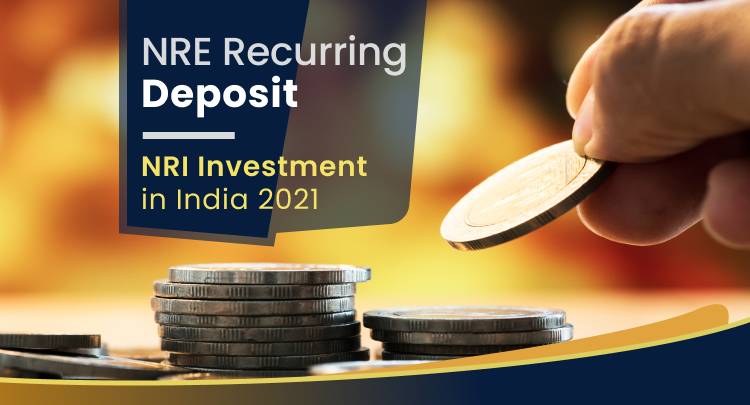NRI Deposits are one of the most sought after investment opportunities by NRIs with a no risk appetite. Deposits promise good returns with no risk. The deposits that NRIs can opt for in India can be subdivided into Fixed Deposits and Recurring Deposits. NRIs can hold only three types of bank accounts in India: NRE, NRO & FCNR. All of these accounts provide Fixed Deposit facility whereas you can opt for a Recurring Deposit in NRE and NRO Bank Accounts. In this article, we will explore the NRE Recurring Deposit in detail.

Before we get into the details, let’s understand the difference between a Fixed Deposit and Recurring Deposit.
Fixed Deposit VS Recurring Deposit
| Fixed Deposit | Recurring Deposit |
|---|---|
| You deposit money at one time for a fixed tenure | You deposit money on a monthly basis for a fixed tenure |
| Tenure ranging from 7 days to 10 years | Tenure ranging from 1 year to 10 years |
| Interest Rate up to 7.25%* | Interest Rate up to 7.25%* |
| Interest received monthly/quarterly | Interest received on maturity |
| No Tax on interest | No tax on interest |
NRE Recurring Deposit
The NRE RD is the recurring deposit linked to the Non-Resident External (NRE) Account of the NRI. The NRE account is used to maintain the income earned outside India for an NRI. You can choose between a fixed and flexible RD where you have to invest a fixed amount every month or different amounts every month respectively.
Most of the top banks in India provide the facility for NRE RD. The process of opening the NRE RD is very simple. You can easily opt for an NRE Recurring Deposit online using the internet banking facility.
Advantages of NRE RD
NRE Recurring Deposit has multiple advantages for NRIs, let’s explore them:
- Interest rates are at par with NRI Fixed Deposits
- Monthly Investments provide flexibility and you don’t need to commit entire amount in one go as compared to FDs
- Even if you miss one or two installments, the RD will be due for repayment at maturity. The actual maturity amount will of course differ. Some banks charge a penalty for non-payment of installments while most banks don’t. You need to check with the respective bank.
- You get nomination and joint account facility
Points to remember:
- Partial payments of installments isn’t allowed
- Since the interest is paid on maturity, premature withdrawal from an NRE RD will result in the return of the principal amount without any interest
- The date of RD installment depends on account opening date
Why choose NRE Recurring Deposit?
With similar benefits as NRE FD, NRE RD is a very convenient option for NRIs who don’t want to invest a lump sum amount. You can use the flexibility of monthly installments and get good returns at maturity.
If you need specialized expert advisory around NRE RD investment in India, contact us using the button below. Also, visit our blog and youtube channel for more details.
Ask SBNRI Investment Expert Now
FAQs
NRO Recurring Deposit is the recurring deposit linked to the NRO Account of the NRI whereas NRE Recurring Deposit is linked to the NRE Account of the NRI. Follow link to know more about NRI Bank Accounts.
Yes RD can be broken before maturity. But since the interest is paid on maturity, premature withdrawal from a Recurring Deposit will result in the return of the principal amount without any interest.
Yes, you can withdraw your Recurring Deposit before the term is over. However, banks generally do not permit partial withdrawal.
Yes. NRIs can opt for NRE FD from their NRE Accounts. Read more
Recurring Deposit is a very convenient option for NRIs who don’t want to invest a lump sum amount. You can use the flexibility of monthly installments and get good returns at maturity.



